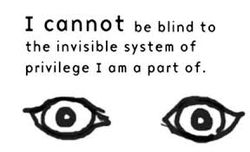Personal Responsibility is Important, But Privilege is Better
 Tuesday, January 28, 2014 at 08:25PM
Tuesday, January 28, 2014 at 08:25PM Occasionally, I get the opportunity to have very personal discussions with students at my school that give me some insight into their lives. Walking through the school and having cursory conversations with young people now on the cusp of adulthood can give a false picture, though, of their day-to-day lives. Looking out into the halls I see a group of happy, seemingly carefree students laughing and smiling with their friends while many of them grow up in neighborhoods that are impacted with crime and structural neglect. One would never know if one didn’t know.
 One 17-year-old senior who was determined to eventually attend law school particularly impressed me. Sitting one day in my office we were talking about his academic success. He told me a story that shocked me as much by his circumstances as by the sure knowledge that his life would have probably overcome me. His house was really just two rooms separated from noisy neighbors by a piece of plastic hanging in a doorway. He and his mother and younger brother lived there with two older brothers living there with their girlfriends and their children. There was no way, he said, that he could do homework at home. Each day he went to Jack-In-The-Box and completed his work there, earning a grade point average that I never accomplished in my quiet, privileged, middle-class home sitting at my desk in my own bedroom. Students like this humble me because I know that their lives present them with obstacles outside of their control that I would most likely not have scaled. In fact, most people I know would not have.
One 17-year-old senior who was determined to eventually attend law school particularly impressed me. Sitting one day in my office we were talking about his academic success. He told me a story that shocked me as much by his circumstances as by the sure knowledge that his life would have probably overcome me. His house was really just two rooms separated from noisy neighbors by a piece of plastic hanging in a doorway. He and his mother and younger brother lived there with two older brothers living there with their girlfriends and their children. There was no way, he said, that he could do homework at home. Each day he went to Jack-In-The-Box and completed his work there, earning a grade point average that I never accomplished in my quiet, privileged, middle-class home sitting at my desk in my own bedroom. Students like this humble me because I know that their lives present them with obstacles outside of their control that I would most likely not have scaled. In fact, most people I know would not have.
I would say that this young man’s personal responsibility in the face of adversity accomplished great things for him. He is a very successful attorney and would be the first to attribute it to his acceptance of personal responsibility. He would also attribute his success to the institutional structures of government assistance that his efforts allowed him to exploit to full advantage. But he also knows that most people, faced with this adversity, would not break away from these circumstances. His brother and niece also came to my school. They did not succeed. Despite his example and help, they could not overcome the circumstances that they did not create. It is such a complex and frustrating condition that injustice creates and calls for what Young calls “the responsibility individuals have for the conditions of the lives of others, as well as their own lives.”
There is, of course, no one solution for the disparate effect that inequitable distribution of resources and a lack of emphasis on structural background conditions create. It becomes a trap that is very difficult to escape despite personal responsibility that would translate into success for those in a more privileged setting. One poor choice or circumstance can overcome those in this setting while leaving others with more resources, privilege, or in a different environment, untouched. Something as simple as the acknowledgement of privilege by those who enjoy it, along with the resultant responsibility to advocate and work for change, could move our nation forward in redirecting the perspective that a lack of personal responsibility is the cause of poverty rather than structural injustice and could be a definitive fork in the road toward the path of historic change.
Reader Comments